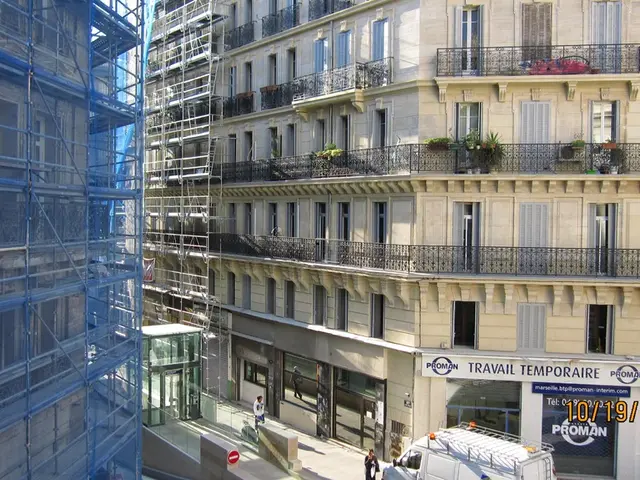Explanations for the architectural design of the courtyards are detailed by the Almaty Urbanism Department
Revamped Article:
Almaty's Mass Land Buyouts: The Untamed Urban Jungle
Much ado about the haphazard construction of courtyards in Almaty, huh? Well, let's get down to the nitty-gritty behind this urban jungle situation, shall we?
Almas Khan Akhmedjanov, the big cheese in Almaty's urban planning and urbanism department, spilled the beans to "Kryisha" about the shocking truth behind the mess. You see, these jury-rigged courtyards cropping up all over the city are a direct result of a wild west-style land grab back in the day.
"It's all a bit lawless," Akhmedjanov told 'em, "These courtyards weren't previously registered to anyone. According to Kazakhstan's Land Code from 2003, 2006, and 2007, anyone could grab an unclaimed chunk of land and register it. Folks just picked a plot, handed it in, and poof! Ownership claimed. Some homeowner associations did the smart thing, registering courtyards as communal property. But most, a whopping 85%, only claimed the plot under the house. And here we are, dealing with the fallout."
But don't fret, Akhmedjanov assures us it's all about to change. "With new rules for shaping Almaty's architecture and urban planning, we're closing those legal loopholes. The Akim's put the kibosh on building courtyards, and we've set rules for courtyard formation based on population density. Each resident gets a fair 10 square meters, roughly 6 to 7 square meters on the lower end. For instance, if we've got 400 peeps, one courtyard should be 0.4 hectares. Simple as that!"
But hey, it's not all smooth sailing. "Now we gotta deal with the mess left behind," Akhmedjanov sighed. "If there's a right to private property, the only way to halt construction is through the courts. Still, things are looking up. We're eliminating these legal gaping holes in our system."
And if you're worried about the legal ramifications, here's the lowdown:
- Lost Ownership Status: Without formal registration, unclaimed courtyards lose legal recognition, leading to disputes over rights and ownership.
- Uncontrolled Development: Unregistered lands can fall victim to unauthorized building or sale, stirring up conflicts with locals.
- Loss of Community Spaces: Unregistered courtyards may lead to restricted access or even loss of beloved communal spaces.
- Administrative Chaos: Unregistered properties make it tough for authorities to enforce regulations, provide services, and collect taxes.
- Social Upheaval: Disputes over ownership can ignite social unrest, particularly if large-scale land grabs threaten community interests.
But fear not! There's hope on the horizon. Kazakhstan's authorities can combat these issues through:
- Formal Registration: Registering all affected communal spaces helps establish clear property rights and prevent illegal activities.
- Comprehensive Audits: Conducting audits of land ownership clarifies boundaries, rights, and usage in affected neighborhoods.
- Legal Framework Enhancement: Strengthening laws governing communal property, buyouts, and urban redevelopment protect residents and ensure proper registration procedures.
- Community Involvement: Involving locals in decision-making ensures their interests are considered and disputes avoided.
- Dispute Resolution Mechanisms: Fair and accessible channels to resolve conflicts peacefully keep the peace.
- Government Intervention: Municipal governments can buy and register unclaimed courtyards as public land to preserve community spaces and prevent unauthorized privatization.
So, there it is! A wild tale of lawlessness, urban planning chaos – and, ultimately, hope for more orderly and just use of Almaty's land. Till the next urban jungle conundrum! 😉🙌🌄🔥💥💪🔥🔥💃🌟🚀🌕🕰️🔥
- In an effort to address the chaos in Almaty's urban planning, the authorities are focusing on revamping the legal framework, aiming to prevent future instances of informal land grabbing in the real-estate industry.
- The financial implications of this situation extend beyond lost property rights, as the lack of formal registration leads to administrative chaos, making it difficult for the government to collect taxes and provide necessary services in affected business districts.
- To ensure a secure future for communal spaces and foster a sense of community, investing in formal registration of these informal courtyards and providing resources for dispute resolution mechanisms becomes crucial for maintaining stability in Almaty's finance and business sectors.








